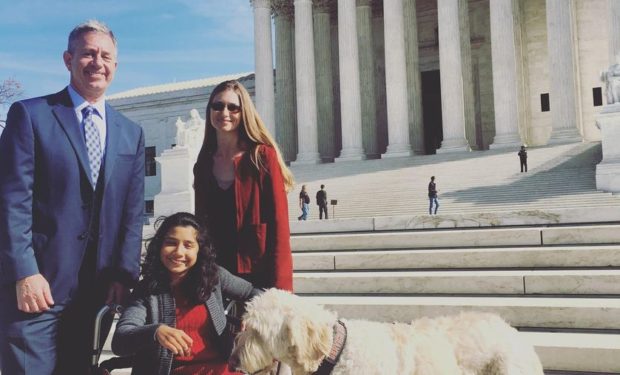No service dogs allowed.
One Michigan school is in for a fight after barring a disabled student’s service dog from entering school premises.
On October 31, 2016, the Supreme Court heard arguments in the case of the girl with disabilities, her service dog, and the school that barred the dog from the school premises. Fry v. Napoleon Community Schools explores the circumstances under which people can recover damages arising from discrimination against the disabled.
The girl’s name is Ehlena Fry and she is from Manchester, Michigan. Ehlena is 12 years old and was born with cerebral palsy, which significantly limits her mobility, but not her cognitive skills. Ehlena’s condition affects her body movement, muscle coordination and balance. Her pediatrician prescribed a service dog to help her live independently. Ehlena’s parents got her a trained service dog, a white goldendoodle, named Wonder. Wonder and Ehlena traveled to Ohio and trained together for two weeks so that Ehlena could use Wonder to help her, for example, open and close doors, transfer from a chair to a walker, or from a walker to a toilet seat. Wonder was also trained to help Ehlena balance, retrieve dropped items, turn on lights, take off her coat, and other tasks.
This case arose in 2009 when Ezra Eby Elementary School, which Ehlena attended, refused to allow her to bring Wonder to school.
“Wonder gave her the mobility support that she needed to learn how to move throughout her environment,” said Stacy Fry, Ehlena’s mother. “She was able to pull to stand using him. She was able to transfer from her walker to her chair utilizing him as the bridge. Eventually, that working relationship developed into [Ehlena] being able to figure out how to do it on her own.”
This case arose in 2009 when Ezra Eby Elementary School, which Ehlena attended, refused to allow her to bring Wonder to school. The school stated that, under the Individuals with Disabilities Education Act (“IDEA”), the district was already paying an aide to help the child, and the dog was unnecessary. The Frys explained that the school officials could not violate Ehlena’s rights under the Americans with Disabilities Act (“ADA”) and deny her a service dog just because the school provided an aide. It would be like saying that a school had no obligation to build a wheelchair ramp so long as volunteers were willing to lift students who used wheelchairs up and down the stairs every day.
Once the American Civil Liberties Union (“ACLU”) of Michigan became involved in Ehlena’s case, the school district allowed Wonder in school for a “trial period,” but they did not allow Ehlena to use him as a service dog. In fact, Wonder had to stay in the back of the classroom and could not accompany Ehlena to recess, lunch, and other activities. Then, at the end of the school year, the district said Wonder could not return in the fall.
Unlike her old school, the public elementary school in neighboring Manchester, welcomed Ehlena and Wonder with open arms.
Ehlena’s parents maintained the dog was necessary because it helped her be more independent, similar to how a Seeing Eye dog would be for a blind student. The family withdrew Ehlena from Ezra Eby Elementary School and home-schooled her for two years, then moved her to another school district, where Wonder stayed with Ehlena until she graduated to middle school. Unlike her old school, the public elementary school in neighboring Manchester, welcomed Ehlena and Wonder with open arms. Wonder could assist Ehlena anywhere in the school, and the principal and teachers used Wonder’s presence as a teaching moment to educate other elementary school students about disability rights. Ehlena is now enrolled in middle school and no longer needs canine assistance, though Wonder still lives with the family.
The family filed a lawsuit in 2012, with the assistance of the ACLU of Michigan, claiming the school violated the ADA, which prohibits discrimination against people with disabilities in employment, transportation, public accommodation and other areas. The central issue in the family’s lawsuit is whether school officials discriminated against Ehlena in violation of the ADA and the Rehabilitation Act of 1973 when they refused, aside from a short trial period, to allow Wonder to aid Ehlena in school. The ADA requires that if parents seek relief that is also available under the IDEA, they must first attempt to obtain that relief through IDEA’s procedures.
…the suit is not about money, but is meant to forge a path for other children with service animals “so that they don’t have to have what happened to my daughter happen to their child.”
The trial court judge threw out the lawsuit, stating that the family had failed to follow all the administrative procedures available before filing the suit in federal court. The United States Circuit Court of Appeals for the Sixth Circuit upheld that decision in 2015, prompting the family to appeal to the Supreme Court. The central legal issue is whether the family was required under IDEA to try all alternative state remedies before filing a federal lawsuit. The American Civil Liberties Union (“ACLU) of Michigan and the National ACLU petitioned the U.S. Supreme Court to rule on whether the group can move ahead with a lawsuit filed on behalf of an 11-year-old Jackson, Michigan student who was also banned from bringing her service dog to class.
“This case could remove an unauthorized hurdle for victims of discrimination across the county who seek justice for violation of rights guaranteed by the Americans with Disabilities Act,” said Michael J. Steinberg, legal director of the American Civil Liberties Union of Michigan. “It’s time for the Supreme Court to settle a dispute among the lower courts and give Ehlena Fry her day in court. To force a child to choose between her independence and her education is not only illegal, it is heartless.” Ehlena’s mother says the suit is not about money, but is meant to forge a path for other children with service animals “so that they don’t have to have what happened to my daughter happen to their child.”
Some justices appeared to be sympathetic to the Frys’ argument. They noted that forcing the Frys to negotiate with school officials over Ehlena’s educational program seemed unfair, especially when her education was not the family’s major concern. What the Frys wanted was the dog — not a human aide — to perform such tasks as helping Ehlena in the bathroom. “All of the harms alleged are essentially compensatory emotional harms,” Justice Sonya Sotomayor said— the type that can be settled under the ADA, not the education law.
Chief Justice Roberts expressed concern that a decision in the Frys’ favor could prompt other families of children with disabilities to gain an advantage over school districts through a “two-track system.” In other words, if families can sue under the ADA law while negotiating their child’s educational program, the court was concerned that the families could gain unfair leverage over the process. However, the court acknowledged, at the same time, requiring Ehlena’s family to go through the IDEA process when their concerns are not about education, would be “a kind of charade.” The justices will also attempt to decide what standard of education schools must provide to students with disabilities under the IDEA — whether it must be “substantial” or just “de minimus.”
Ehlena attended the argument. The pup waited outside. But the two were happily reunited after an hour’s debate — at which time Ehlena Fry pronounced the proceedings “cool” and offered a prediction: “I think we will win.” The back-and-forth was all moot for Wonder, who has been retired as a service dog and appeared content to wait on the court’s plaza along with several other students with disabilities and their service dogs, all products of the training program “4 Paws for Ability.” “Wonder was really the bridge” for Ehlena to gain independence from other human assistance, her mother, Stacy Fry, said outside court. By pressing the case, she said, “We would really like to make a difference for kids who use service dogs.” A ruling is due by the end of June.






